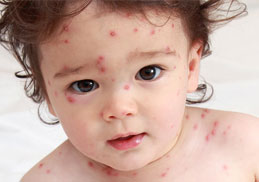Chickenpox Treatment

Chickenpox is a viral disease characterized by red itchy rashes that are accompanied with fever (102 to 103 degrees) and general fatigue. Generally seen during summers, it is one of the most common infectious diseases of childhood (although it occurs in adults sometimes). The disease is named so, because the boils on the skin resemble the peck marks of a chicken.
People suffering from chicken pox acquire immunity against the disease for lifetime (means the chances of getting infected with the virus again is negligible) as they develop antibodies against the virus. However, in some cases the virus can reactivate later in life and cause shingles. With the introduction of chickenpox vaccine, there has been a significant reduction in the number of cases of this condition. Here’s what you should know about chickenpox including its treatment options and precautionary measures.
Chickenpox is caused due to an infection by Varicella Zoster virus (VZV). It is highly contagious in nature and can spread by various means such as –
A person usually shows the symptoms of chickenpox after 15 – 16 years of infection. The initial symptoms are flu-like (high fever, headache and coughing or sneezing) and thus, are confused with viral fever leading to missed or delayed diagnosis of the condition. And after a day or two, rashes appear on the skin which later spreads to the entire body. The boils or blisters burst after about 2 days and once the scab falls off, the patient can resume their normal daily chores.
The 6 classic symptoms of chickenpox are –
It takes around 10 days for the body to recover from the illness. In the meantime, the infected person should take sufficient rest and be completely isolated (stay indoors and avoid contact with people). Here is detailed information on 6 classic chicken pox symptoms you should know about.
It is usually a self-resolving condition and thus, your doctor will most probably prescribe medicines to help relieve the symptoms. The medications include –
Antiviral drugs: Aciclovir is the common prescription drug that is given to shorten the duration of symptoms. Pregnant women and people with weak immune system are generally recommended this drug.
Antihistamines: Antihistamines are prescribed to relieve itching and swelling. Also, painkillers are recommended to combat pain caused due to bursting of boils.
Antibiotics: They are recommended only if a person develops bacterial infection due to itching. However, these types of infections are very rare.